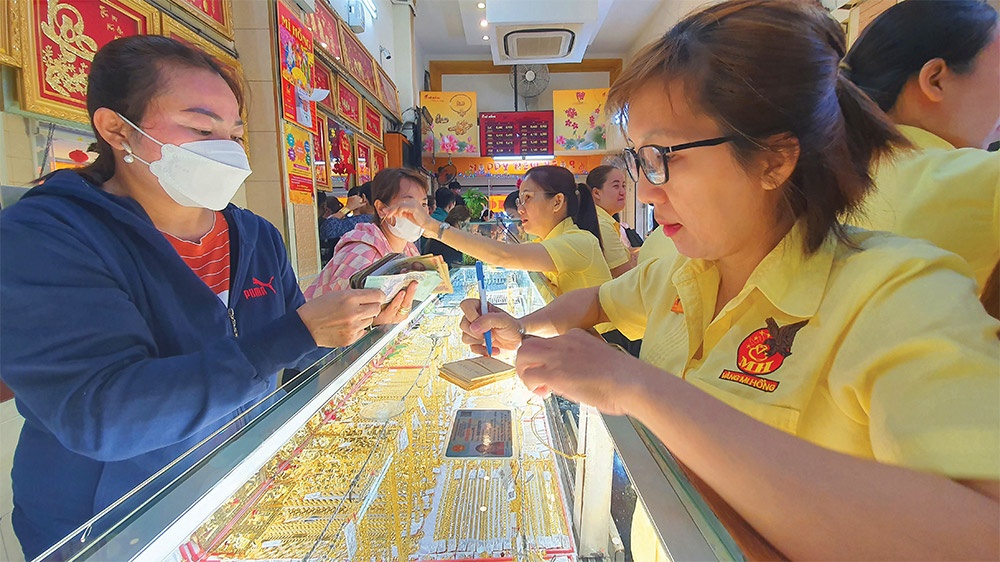INTERNATIONAL INVESTMENT
AND PORTAL
 Fairer rules could yet be established to produce a healthy and robust gold market, Photo: Le Toan
Fairer rules could yet be established to produce a healthy and robust gold market, Photo: Le Toan
On May 30, the State Bank of Vietnam announced the results of inspections into six major banks gold trading entities including SJC, DOJI, PNJ, Bao Tin Minh Chau, TPBank, and Eximbank.
The primary violations identified among these entities pertain to anti-money laundering regulations, including inadequate customer identification and failure to report large transactions.
Additional infractions involve discrepancies in documentation, accounting, taxation, and instances of misleading product information aimed at attracting customers, leading to unfair competition.
SJC, PNJ, DOJI were fined a total of $85,600, $3,600 and $54,600 respectively, while Bao Tin Minh Chau received the highest penalty at $105,600.
Party General Secretary To Lam chaired a meeting with the Central Policy and Strategy Committee, emphasising the need for a comprehensive overhaul of gold market management.
“The state should not replace the market but must establish fair rules and implement controlled regulation to foster a healthy gold market. This approach transforms gold into a resource rather than a policy burden,” he stated.
He also advocated for the development of the domestic gold jewellery market to gradually position Vietnam as a centre for high-quality gold jewellery manufacturing and export, thereby converting hoarded gold into value-added products.
“It is necessary to promptly establish an information and data system on the gold market to enhance transparency and disclosure, enabling effective taxation, management, and impact assessment on the foreign exchange, exchange rate, and various investment channels,” he added.
The effectiveness of gold market governance and inter-agency coordination must be improved, particularly in combating gold smuggling, Party General Secretary Lam explained. “The role of the Gold Business Association should be strengthened as a bridge between gold enterprises and regulatory authorities, helping to promptly relay challenges, submit policy recommendations, and coordinate market stabilisation measures when necessary,” he stated.
Responding to his remarks, Assoc. Prof. Dr. Ngo Tri Long, former director of the Price and Market Research Institute under the Ministry of Finance, emphasised that the gold market can no longer be governed by rigid administrative tools.
“While past policies, such as restricting supply, monopolising gold bar production, and limiting imports, once helped stabilise the exchange rate and curb dollarisation, they have now caused serious distortions,” he said. “The record-high gap between domestic and global gold prices has fuelled speculation and smuggling. Consumers are forced to buy gold at inflated prices, undermining trust in gold as a legitimate savings asset.”
Long also called for an end to the gold bar monopoly and for allowing controlled imports. “Gold should not be imported through rigid auctions,” he noted. “Instead, import quotas should be granted based on actual capacity, legal compliance, and audit transparency. This ensures fairness, competition, and limits market manipulation.”
“Vietnam needs a market-driven, disciplined gold policy aligned with international practices,” he concluded. “A national gold exchange, possibly integrated into Ho Chi Minh City’s international financial centre, should be established to ensure transparent, centralised trading and reduce black-market activity.”
Agreeing on the establishment of a gold exchange, Assoc. Prof. Dr. Pham The Anh, dean of the Faculty of Economics at National Economics University, stated that now is the appropriate time to study and develop a legal framework for such an exchange.
“A gold exchange will reduce dependence on physical gold. Somehow, people will trust that market. The State Bank of Vietnam’s task is to amend Decree 24 on gold market management. The recent gold market reflects macroeconomic instability,” he added. “Domestic gold prices depend on global prices but show more instability. Therefore, eliminating exclusive gold brands will lead to a freer and more competitive gold market.”



















